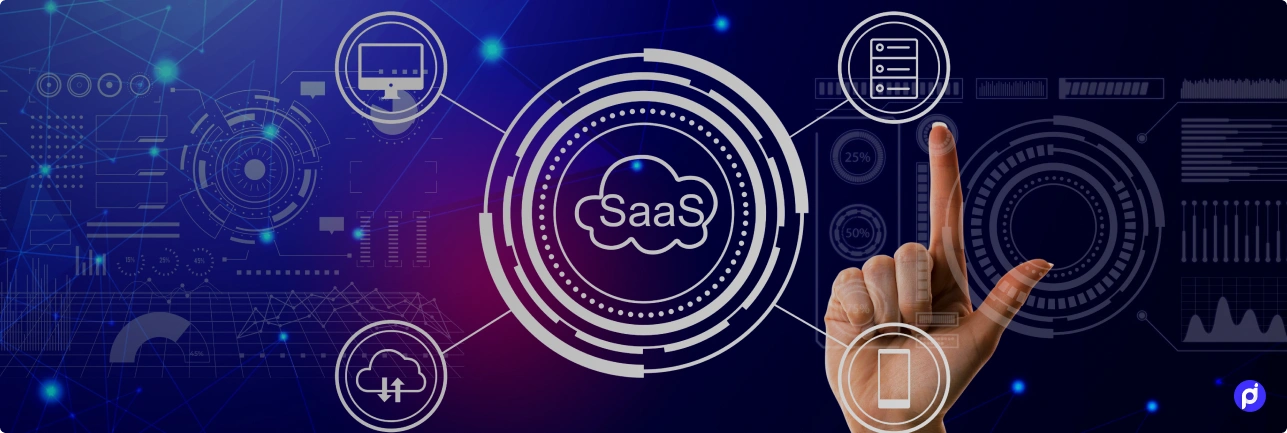Rapid growth of SaaS apps has fueled a demand for skilled developers proficient in a diverse tech stack. To build successful SaaS applications, developers rely on a combination of programming languages, frameworks, databases, and cloud platforms.
This blog shall discuss the core technologies commonly used by SaaS application developers.
Technologies Utilized by SaaS App Developers:
1. Programming Languages
The foundation of any software, programming languages provide the syntax and structure. Popular choices for SaaS development include JavaScript, Python, and Ruby. JavaScript, with its versatility, is used extensively for both front-end and back-end development through Node.js. Python, renowned for its readability, powers many SaaS applications with frameworks like Django and Flask. Ruby, with its focus on rapid development through Ruby on Rails, is another preferred option.
2. Front-end Frameworks
To create engaging user interfaces, SaaS Application Developers often use front-end frameworks. React, with its component-based architecture, offers efficient rendering and is widely adopted. Angular, a comprehensive framework backed by Google, provides structure for complex applications. Vue.js, known for its simplicity, is gaining traction for its flexibility.
3. Back-end Frameworks and Libraries
The server-side logic of a SaaS application relies on back-end technologies. Node.js, a JavaScript runtime, enables efficient and scalable back-end development. Python’s Django framework provides a high-level structure for rapid development. Ruby on Rails, a full-stack framework, follows the MVC architecture for streamlined development.
4. Databases
Storing and managing data is crucial for SaaS applications. Relational databases like MySQL, PostgreSQL, and SQL Server are suitable for structured data. For handling large volumes of unstructured or semi-structured data, NoSQL databases such as MongoDB, Cassandra, and Redis are often employed.
5. Cloud Platforms
Sometimes a SaaS App Developer Use Cloud platforms to offer SaaS solutions. Amazon Web Services, Microsoft Azure, and Google Cloud Platform are just leaders. They offer services like storage, databases, and more to support the development and deployment of SaaS applications.
Overall Idea
If you want to build a robust SaaS app for your business, ensure that the SaaS app developers rely on a versatile combination of JavaScript, Python, and Ruby for the application’s core. Coupled with front-end frameworks like React, Angular, or Vue.js, they craft engaging user interfaces. Back-end development is facilitated by Node.js, Django, or Ruby on Rails. To manage data efficiently, relational and NoSQL databases are employed. Finally, cloud platforms like AWS, Azure, or GCP provide the infrastructure for scalable deployment.
FAQs:
FAQ 1: What are the most common programming languages used in SaaS development?
Answer: The most popular programming languages for SaaS development are JavaScript, Python, and Ruby. JavaScript is versatile for both front-end and back-end (Node.js), Python is renowned for readability and frameworks like Django and Flask, while Ruby offers rapid development with Ruby on Rails.
FAQ 2: What are the key front-end and back-end frameworks for SaaS applications?
Answer: For front-end development, React, Angular, and Vue.js are widely used. React is known for its component-based architecture, Angular offers a comprehensive framework, and Vue.js is appreciated for its simplicity. On the back end, Node.js, Django, and Ruby on Rails are popular choices, providing efficient and structured development approaches.
FAQ 3: Which databases are commonly used in SaaS applications?
Answer: SaaS applications typically use a combination of relational and NoSQL databases. Relational databases like MySQL, PostgreSQL, and SQL Server are suitable for structured data, while NoSQL databases such as MongoDB, Cassandra, and Redis excel in handling large volumes of unstructured or semi-structured data.
FAQ 4: Why are cloud platforms essential for SaaS development?
Answer: Cloud platforms like AWS, Azure, and GCP offer the infrastructure, scalability, and flexibility required for SaaS applications. They provide services like storage, databases, and computing resources, enabling developers to focus on application development without managing the underlying infrastructure.
FAQ 5: What is the ideal tech stack for building a robust SaaS application?
Answer: A robust SaaS application typically combines JavaScript, Python, or Ruby for programming, React, Angular, or Vue.js for the front-end, Node.js, Django, or Ruby on Rails for the back end, relational and NoSQL databases for data management, and cloud platforms for deployment and scalability. The specific choice of technologies depends on the application’s requirements and the development team’s expertise.





